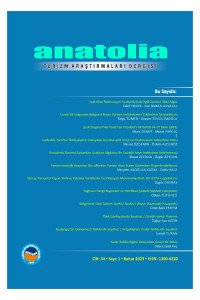Abstract
Pasaport, yabancı ülkelere gideceklere yetkili kurumlarca verilen ve kimlik incelemesinde geçerli olan belge anlamını taşır. Osmanlı Devleti’nde pasaport uygulaması 19. yüzyılda modern devlet anlayışının ürünü olarak ortaya çıkmıştır. Temelinde nüfus ve göç hareketlerini denetim altına alma kaygısı yatan bu uygulama ile kamu düzeninin korunması amaçlanmıştır. Osmanlı klasik devrinde “yol hükmü” denilen belge türünün 19. yüzyıla gelindiğinde “mürur tezkiresi” adını aldığı, 1867 yılına gelindiğinde doğrudan pasaport işlemlerine yönelik çıkarılan nizamname ile modern anlamda pasaport uygulamasına geçildiği görülmektedir. 1884 ve 1894 yıllarında çıkarılan iki nizamname ve 1911 yılında çıkarılan Pasaport Kanunu Osmanlı Devleti’nde pasaport uygulamalarına nihai şekli vermiştir. Bu çalışmada o dönemde kullanılan bir pasaport tanıtılmıştır.
References
- Akkoç. A.B. (2019). Osmanlı Devleti'nde Pasaport Nizamnameleri ve Bunların Uygulamadaki Boyutları (Basılmamış Yüksek Lisans Tezi). İstanbul: Mimar Sinan Güzel Sanatlar Üniversitesi Sosyal Bilimler Enstitüsü.
- Başkanlık Osmanlı Arşivi, Dahiliye Emniyet-i Umumiye Seyrüsefer Tasnifi Evrakı (BOA, DH.EUM. SSM), nr. 52/47.1.
- Başkanlık Osmanlı Arşivi, Yıldız Perakende Tasnifi Dahiliye Evrakı (BOA, Y.PRK.DH), nr. 83/1.1.
- Kütükoğlu. M. S. (2006). “Mürur Tezkiresi”. (Cilt 32, ss. 60-61). İstanbul: Türkiye Diyanet Yayınları.
Abstract
A passport means a document that is given by authorized institutions to those who will go to foreign countries and is valid for identity examination. The passport practice in the Ottoman Empire emerged as a product of the modern state understanding in the 19th century. With this practice, which is based on the concern of controlling population and migration movements, it is aimed to protect public order. It is seen that the type of document called “road provision” in the Ottoman classical period took the name “mürur tezkire” by the 19th century, and by 1867, the passport practice in the modern sense was started with the regulation
issued directly for the passport. Two regulations enacted in 1884 and 1894 and the passport law of 1911 gave the final form to passport practices in the Ottoman Empire. In this study, a passport used at that time is introduced.
Keywords
References
- Akkoç. A.B. (2019). Osmanlı Devleti'nde Pasaport Nizamnameleri ve Bunların Uygulamadaki Boyutları (Basılmamış Yüksek Lisans Tezi). İstanbul: Mimar Sinan Güzel Sanatlar Üniversitesi Sosyal Bilimler Enstitüsü.
- Başkanlık Osmanlı Arşivi, Dahiliye Emniyet-i Umumiye Seyrüsefer Tasnifi Evrakı (BOA, DH.EUM. SSM), nr. 52/47.1.
- Başkanlık Osmanlı Arşivi, Yıldız Perakende Tasnifi Dahiliye Evrakı (BOA, Y.PRK.DH), nr. 83/1.1.
- Kütükoğlu. M. S. (2006). “Mürur Tezkiresi”. (Cilt 32, ss. 60-61). İstanbul: Türkiye Diyanet Yayınları.
Details
| Primary Language | Turkish |
|---|---|
| Subjects | Tourism (Other) |
| Journal Section | Tourism History Reviews |
| Authors | |
| Publication Date | April 30, 2023 |
| Published in Issue | Year 2023 Volume: 34 Issue: 1 |


